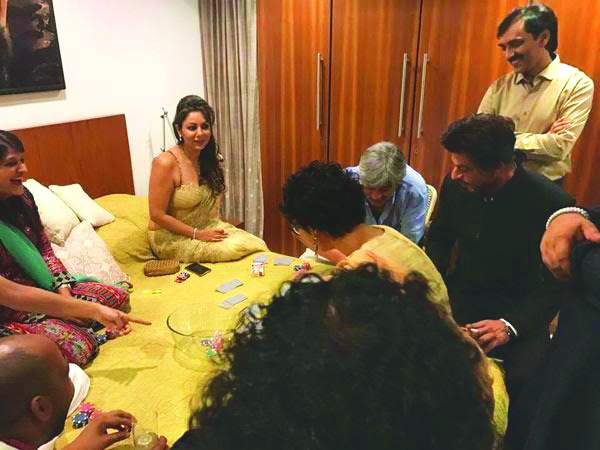Above: People playing cards at a get-together. Photo: Bhavana Gaur
The recent hullabaloo over a den of vice in a South Delhi farmhouse has shown the hypocrisy of Indians for whom gambling is a part of their social and cultural lives
~By Bikram Vohra
The arrest of 30 people from a private farmhouse in upscale South Delhi for high stakes gambling underscores the hypocrisy in our approach to betting and playing the odds. This swoop is being painted in lurid colours as a major “win” for the cops and written up as a den of vice and iniquity. Sure, the “By Invitation Only” casino replete with roulette table, blackjack and poker unearthed chips worth crores and those who run it have clearly broken all the rules.
Fine them if you have to, but stop making it look like piety has won the day. We are one of the biggest gambling nations in the world. It is in our DNA.
Truth be told, how is it any different in texture from the sanctioned by religion “Teen Patti” orgy that goes on in the run-up to Diwali and is almost a benediction to the goddess Lakshmi? I don’t think the hundreds of thousands who chance their luck for propitious salutation have the permission or clearance to gamble.
BREAKING LAW
It is said that in the privacy of one’s home, a blind eye can be turned to breaking the law in its strictest fashion. It is ironical that this occurred during the time that the historical Supreme Court decision on privacy rights has a certain validity.

The law is rusty and dates back to the Public Gambling Act, 1867 which prohibits the running of a den or facility and also indicts those who visit the premises. When the legal eagles go into the act, even the Supreme Court had indicated its preferences, handing down this assessment: “The game of Rummy is not a game entirely of chance like the ‘three-card’ game mentioned in the Madras case to which we were referred. The ‘three card’ game which goes under different names such as ‘flush’, ‘brag’ etc. is a game of pure chance. Rummy, on the other hand, requires a certain amount of skill because the fall of the cards has to be memorised and the building up of Rummy requires considerable skill in holding and discarding cards. We cannot, therefore, say that the game of Rummy is a game of entire chance. It is mainly and preponderantly a game of skill.”
As things stand, the fine for playing in an illegal premise is Rs 100. So all those people gambling in five figures in Fatehpur Beri, where the farmhouse is located, should be home and free without coughing up a fortune. Those who are running the place clearly have the clout, so we will never know which big fish was caught in this net and by law, their fine is a huge Rs 200 for operating an illegal gambling set-up.
ONLINE BETTING
Ironically, online gambling attracts larger fines in India and can go up to Rs 9,000 per day for the indulgence. But being a conduit for online activities can, under The Information Technology Act 2000, which regulates cyber activities in India and bans publication or transmission of information that can corrupt people, be draconian and drenched in piety in its texture. The fine is Rs 1,00,000 or imprisonment up to five years.
With the advent of online betting, Indians now wager over $60 billion annually, half of it illegal, in the hope of hitting a jackpot and escaping poverty
Let’s see now. Goa is still part of India but we officially duck the rules by allowing offshore casinos. The little state makes nearly Rs 200 crore in offshore casinos. The millions of masses who play satta and matka and its many wondrous forms every night turn over sums that would make the raid on South Delhi come off like penny-ante stuff. The mafia gangs who run the number games are beyond the law and no one would even think of shutting them down at all.
And if it is that holier than thou angle of saving the poor from themselves, it is difficult to justify the several hundred concurrent lotteries officially being run for the underprivileged, thereby selling them a dream in 13 states where it is legal and happily available in the others. With the advent of online betting, Indians now wager over $60 billion annually, half of it illegal largely in the hope of hitting a jackpot and escaping the clutches of poverty.
Horse racing, dog runs and cock fighting are rural givens and in urban areas, card and coin games abound. Anyone taking a train in Mumbai will not dare to disturb the “regulars” intent from Churchgate to Borivili on the hand dealt to them.
Bridge, Rummy and tombola are staples at army clubs and civilian watering holes and you do not see anyone stopping them. We even bet big on cricket. Come to think of it, even cricketers bet on themselves.
Yet suddenly, in a surge of piety, we will be told of how the place is being cleaned up and there will be this assault on a private location and much outrage soaked in shrill horror.
Place your bets, please.


